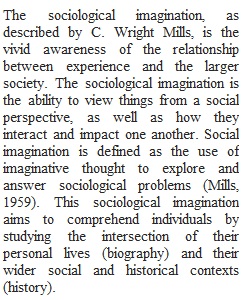


Q Mills: Based on Mills’ description, what do you think the sociological imagination is? What does Mills say is the difference between “issues” and “troubles”? Give an example.Schuman: 1. What characteristics of surveys should give us faith (or not) in their findings? 2. Why are surveys important for collecting social information? What types of information are they especially good at collecting?Adler & Adler: 1. What characteristics of ethnographic research should give us faith (or not) in researchers’ findings?
View Related Questions